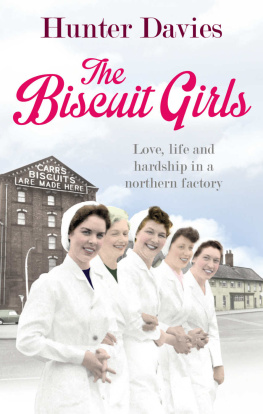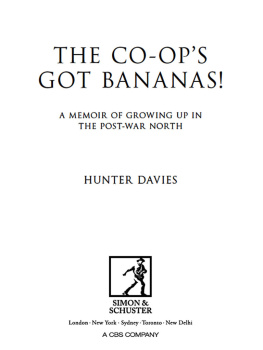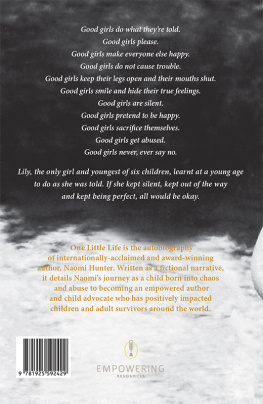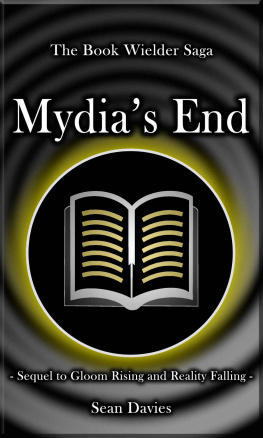Hunter Davies - The Biscuit Girls
Here you can read online Hunter Davies - The Biscuit Girls full text of the book (entire story) in english for free. Download pdf and epub, get meaning, cover and reviews about this ebook. City: England--Carlisle, year: 2014, publisher: Ebury Publishing, genre: Non-fiction. Description of the work, (preface) as well as reviews are available. Best literature library LitArk.com created for fans of good reading and offers a wide selection of genres:
Romance novel
Science fiction
Adventure
Detective
Science
History
Home and family
Prose
Art
Politics
Computer
Non-fiction
Religion
Business
Children
Humor
Choose a favorite category and find really read worthwhile books. Enjoy immersion in the world of imagination, feel the emotions of the characters or learn something new for yourself, make an fascinating discovery.
- Book:The Biscuit Girls
- Author:
- Publisher:Ebury Publishing
- Genre:
- Year:2014
- City:England--Carlisle
- Rating:4 / 5
- Favourites:Add to favourites
- Your mark:
- 80
- 1
- 2
- 3
- 4
- 5
The Biscuit Girls: summary, description and annotation
We offer to read an annotation, description, summary or preface (depends on what the author of the book "The Biscuit Girls" wrote himself). If you haven't found the necessary information about the book — write in the comments, we will try to find it.
The Biscuit Girls — read online for free the complete book (whole text) full work
Below is the text of the book, divided by pages. System saving the place of the last page read, allows you to conveniently read the book "The Biscuit Girls" online for free, without having to search again every time where you left off. Put a bookmark, and you can go to the page where you finished reading at any time.
Font size:
Interval:
Bookmark:
Contents
I wore my overalls all evening, I wanted everyone in the street to see me, show them I was in work. I arrived early for my first day and stood looking through the windows at all the girls working away. It all seemed so big and daunting. I was very nervous, but I always loved working there, from day one.Ivy
Ivy, Dulcie, Barbara, Ann, Dorothy and Jean all had different reasons for applying for work at Carrs of Carlisle, but once they had put on their overalls and walked through the factory gates they discovered a community where they worked hard, gossiped, got into scrapes and made lifelong friends.
Beginning in the 1940s, this is the true story of the Home of Biscuits, based on the vivid recollections of six of the women who helped send Carrs biscuits around the world.
Hunter Davies was brought up in Carlisle, educated at Durham University, and now lives half the year in London and half in the Lake District.
As a journalist he worked on the Sunday Times, where he was chief features writer, and later editor of the magazine. He wrote regular columns for Punch and currently writes for the New Statesman, The Sunday Times, the Mail on Sunday and Cumbrian Life. For three years he presented Bookshelf on BBC Radio 4.
He is the author of over forty books, including biographies, novels, childrens novels (Flossie Teacake) and several books about the Lakes. He is the author of the only official biography of the Beatles.

In the 1950s, when my twin sisters Marion and Annabelle were at the Margaret Sewell School in Carlisle and my wife Margaret was at the Carlisle and County High School for Girls, teachers would warn all the girls that if they didnt stick at their lessons they would end up as cracker packers.
Everybody in Carlisle knew what that meant and still do, for the phrase and the activity continues to this day. It referred to the women workers on the production line at Carrs biscuit factory, standing there all day, packing crackers. Who on earth would want to do that sort of menial, tedious, repetitive job? That was the fairly unsubtle message, not to say dreaded warning to get a grip, get your head down, pass those exams, get some proper qualifications and then you will be off, free and independent, not condemned to a life of factory work.
But of course for many unskilled, unschooled workers, Carrs was looked upon as a good job, attracting women from all over the surrounding area. Ethel Bragg, the mother of Melvyn Bragg (the writer and broadcaster, now Lord Bragg of Wigton), worked at Carrs from 1930 to 1931, coming in each day on the bus. She died in 2012, aged ninety-five.
My mother was a cracker packer for about a year, so Melvyn told me, until her name came up for a job in her home town at Redmaynes, the clothing factory, where she made buttonholes until she married in 1938 when, as was the custom, she was fired for the offence of matrimony. She was very happy working at Carrs. It was one of the very few jobs available for girls who left school at fourteen and what used to be delightfully called without any qualifications. She used to get the bus from Wigton into Carlisle and get off at Trinity Church now gone which was the bus stop opposite the biscuits works. At home, we always bought Carrs water biscuits.
Factory workers have always had a bad press. In all towns, in all industrial nations, at all times, since it all began, there has always been one factory, one sort of job which has become a term of contempt or of pity, about which local people either sneer or feel sorry. Charles Dickens scared the souls off all right-thinking Victorians by his memories of sticking labels on bottles of shoe polish in Warrens boot blacking factory. Today we have dreadful tales of sweat shops in China and south-east Asian clothes factories.
When Margaret went on to Oxford on an Open Scholarship, and got her name on the Honours Board in the school hall, she used to come home to Carlisle and say she would have learned more about real life had she gone to work at the Carrs factory.
Obviously, aged nineteen, she knew little about real life, at Carrs or elsewhere, and it was a bit of bravado. And yet she knew there was something about these women whom she had met, had listened to when growing up on the Raffles council estate, whose lives and opinions and experiences were just as valid as anyone with a fancy education or more privileged background.
In the 1950s, women had already been packing crackers at Carrs for well over a hundred years, in a factory producing biscuits that dates back to 1837, which boasted that it was the home of biscuits. Many of them had served there for the whole of their working lives, loyal and proud to have worked for Carrs, a benevolent family firm, some of them receiving long-service awards after clocking up forty-five years. The workers must have known that they were engaging in a meaningful if modest task, their minds probably miles away while they were silently, automatically packing crackers that would be dispatched around the world. For were not Carrs Table Water Biscuits known and enjoyed in all the corners of the globe? So they were being told in the company magazine, the Topper Off.
Many years later, in 1997, Margaret published a book about the history of Carrs, Rich Desserts and Captains Thin. The title is a bit of a mouthful they were two of Carrs famous early biscuits.
In her book, she was dealing with the early years, from 1831 to 1931, and it was mainly about the Carr family, following them down the generations. It won a prize and sold well and naturally I am greatly indebted to it for background information. At the time, though, I remember her moaning about the lack of letters from the main participants, about the problem of finding any colour or personal details or about real life on the factory floor. But it was meant to be a serious, quasi-academic study, of a pre-war family business dynasty. It did not concern itself with the workers, or the post-war decades. Which is what I have now decided to attempt.
What was life really like for the ordinary women factory workers, the ones who packed the biscuits? How did they stand it? Were they just doing it for the money? How hard was it? Were they happy, accepting or merely resigned? Or was it their home and personal life, outside their factory life, that really mattered to them?
There is some decent oral history of what it was like be a Carrs factory worker, tape-recorded interviews that cover the period back to the First World War. They were made in the 1950s and again in the 1980s, part of that sudden interest in capturing working-class, local history, which sprang up after the last war and is today available in most local library and records offices.
It is noticeable, in the Carlisle archives, that members of the Carr family, so important in the city and the county for many decades, were not interviewed. It was the ordinary workers that archivists wanted to capture in those post-war years.
I have listened to and read many of these oral accounts, and found them all fascinating but I have not used them here, except for a couple of examples. For, while they are rich on the inter-war or immediate post-war years, they are stories of women now dead, and the task I set myself was to capture the stories of women still alive today, who started in the 1940s, 1950s and 1960s, and some of whom were still working at the factory up until the last couple of years. For life at Carrs, and at similar factories all over the country, all over the world, still goes on, though the number of factory workers in the UK is roughly half of what it was in the immediate post-war years.
Next pageFont size:
Interval:
Bookmark:
Similar books «The Biscuit Girls»
Look at similar books to The Biscuit Girls. We have selected literature similar in name and meaning in the hope of providing readers with more options to find new, interesting, not yet read works.
Discussion, reviews of the book The Biscuit Girls and just readers' own opinions. Leave your comments, write what you think about the work, its meaning or the main characters. Specify what exactly you liked and what you didn't like, and why you think so.












